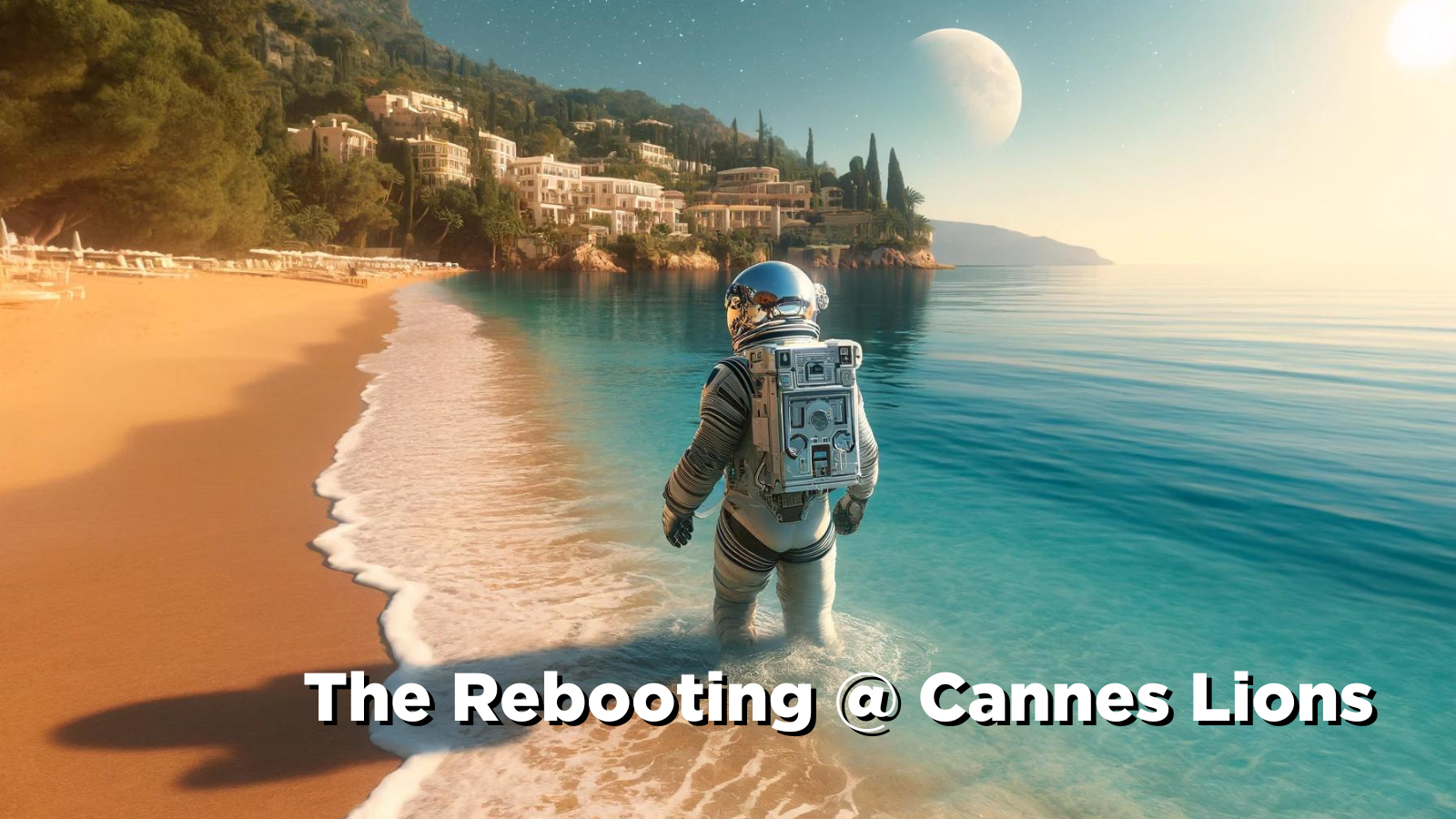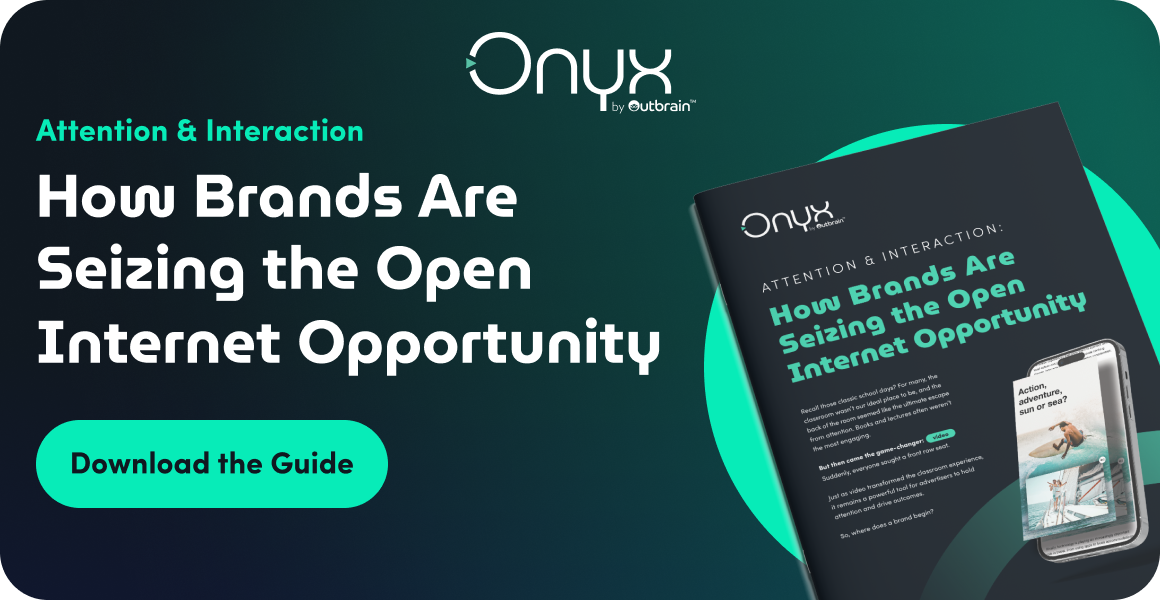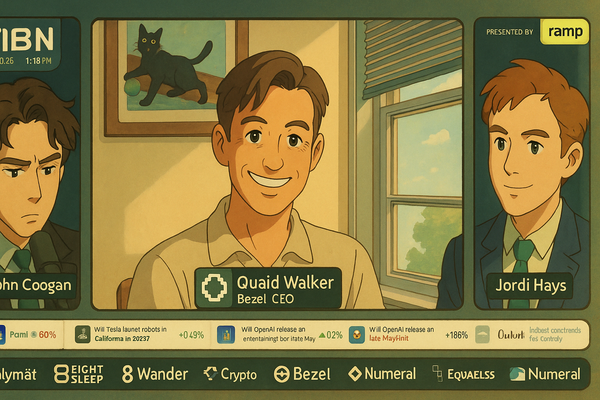No beating the market

Welcome to my dispatches from Cannes. All week, I’ll be sharing my impressions and conversations. If you’re in Cannes, check out some events The Rebooting is doing throughout the week. Also, I have a couple spots open for a cocktail party on Wednesday from 5-7pm. Send me a note if you want one: bmorrissey@therebooting.com
Thanks to Onyx by Outbrain for sponsoring this week’s newsletters.

Harnessing the open internet opportunity

The open internet is a dynamic environment where consumer attention dictates brand success. As video content continues to reign supreme, understanding and capturing this attention is crucial for advertisers aiming to influence outcomes and build brand equity. The consideration phase is a critical juncture, and the open internet is where informed audiences make their decisions.
Effective advertising in this space means knowing where your audience's attention lies and meeting them there with content that matters. Gain the insights you need to succeed with Onyx by Outbrain’s "Attention and Interaction" playbook, your essential guide to mastering this digital domain.
Around the Croisette
- The event walk-up story is a mostly grim genre. Coming up with a singular theme for a sprawling carnival of capitalism is a tough task. At BI, my former colleague Lara O’Reilly took a sensible path by hanging her piece on, what else, AI. I have no doubt it will be mentioned frequently by people who never have it much thought before a year or so ago. It’s still so early in applications — this is firmly in the buildout phase still — that it’s an ideal talking point for Cannes.
- A twist on the walk up is the insider guide. Grizzled Cannes veteran David Griner at Adweek goes that path, calling out some safe bets for talking points like AI and backtracking on DEI. Another Adweek piece charts how awards submissions are down 38% since their peak in 2016. One thing that will be up: celebrities.
- Cannes is a media business. It just skips the publishing part. Cannes didn’t resist the tech and data takeover because of its legacy. It went for the money. Last year, it generated some $129 million. And the money isn’t in cashing checks from Brazilian ad agencies for a scam ad that the client didn’t even know existed and only ran once in the middle of the night. Sponsors pay an average of $330,000. The economic impact is far greater, as the festival itself doesn't capture a lot of spending that goes to fringe events and the like.
- The Battle of Hotel du Cap: The legend of Michael Kassan continues. Adweek has the “exclusive” on his new, totally different from MediaLink competitor to MediaLink that is pretty much just like MediaLink and staffed by people who left MediaLink. Prepare for dueling cocktail parties. Each industry gets the guru it deserves. Music has Rick Rubin, advertising has Michael.
- Cannes tip: It’s OK to be cynical, to a degree. The Cannes finesse is to show enough self-awareness of what presents as an indefensible boondoggle of epic proportions while not coming across as an ingrate who has hardship duty on the Riviera for a week.
No beating the market
Last week, I sat talking to a publishing CEO while we looked out over Manhattan. The view was one of those sweeping shots from Succession.
The view was fantastic, but we sat in a mostly barren office. The CEO was clinical in his diagnosis: Nobody can escape the market. It will tell you the truth.
Discussions in publishing circles these days tend to be tense. A different publishing executive at a dinner last week lowered his voice like he was talking about an unfortunate medical diagnosis to say, “I’m not sure many will make it.” Another veteran of the messy, on-again and off-again platform-news relationship wanted to know my opinion on the AI deals. I gave my middle-of-the-road stance — take the money, play for time to build resiliency — to find them less optimistic.
Beyond the food, panoramas and endless cocktail parties, Cannes serves as a useful barometer for an ad market that’s rapidly decoupling from publisher businesses. A rising tide does not lift all boats. Ad spending is powering ahead, with GroupM expecting 7.8% growth globally and 5.8% in the U.S. The U.S and China now account for 57% of all ad spending.
The ad economy is doing just fine, only it is restructuring to reward the dominant platforms and newcomers from retail media and streaming. GroupM sees the Big Five of tech platforms taking nearly four fifths of all spending. Retail media is the fastest growing digital channel, expanding 17.5% this year with another 13.5% forecast for next year.
Compare that with what is universally acclaimed as the top news publisher of scale: The New York Times. In the first quarter, its ad business shrank 2.4% and is on pace to be smaller than its “other” category. (To be fair, digital ad revenue was up 2.9%.) According to GroupM, the digital ad businesses of newspapers and magazines will have incremental growth over the next five years – .6% for newspapers and 1.5% for magazines – severely lagging the overall ad market.
News publishers are mostly bit players in Cannes because they are increasingly bit players in the ad market. The big money comes from data and ad tech players and the giant tech companies.
The digital ad market is rewarding those with vast stores of data that can show their ads worked. Never mind if they’re grading their own homework or whether the closed-loop attribution is capturing what led to success, it’s about the receipts.
Publishers are one of many actors, competing with TikTok kids and the grocery store chain hopped up on shopper data. They’re not winning.
This morning, I’ll be at the GroupM rooftop to discuss the state of the ad market with GroupM’s global president of business intelligence Kate Scott-Dawkins. Later, I’ll be joined by Washington Post CRO Johanna Mayer-Jones and Outbrain CEO David Kostman will join me and Kate to talk about how news competes in this ad market — or whether an ad model for news is destined to be a niche business.
Keyword blocklists are dumb, but they’re also a symptom of something more fundamental. They speak to how advertising on news is not viewed as necessary. On our prep call, it was offered that senior marketers are often not even aware they are blocking news sites. If the CMO doesn’t even know they’re blocking the category, that’s not a great sign of the importance news publishers have to their customers.
Part of the struggle is simple math. The market roughly follows attention, and news is generating less attention than it used to. There’s no way an ad business keeps growing if it loses half of attention like the Post.
That’s one reason I believe the changes roiling news organizations right now are needed. The market has shifted. Publishers have to respond like any other business.
That publishing CEO last week mused to me how this industry had it easy until about 2005. That’s changed. Time to compete, not just with other publishers but with everyone, everything, all the time.
Send me your Cannes celebrity sightings and observations of the carnival by hitting reply.




